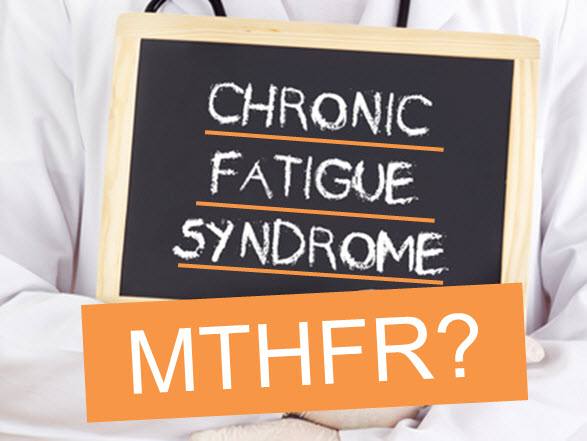Chronic fatigue syndrome or CFS is a popular term used to describe a condition that leaves you feeling tired all of the time. You may lack energy and or be unable to properly cope with stress. This condition is also known as adrenal fatigue. Adrenal fatigue happens when your body’s normal stress response system becomes overwhelmed. Can no longer keep up the demand for essential hormones that deal with stress.
These hormones help you to respond to stress and they help you to overcome stress. So prolonged stress can run you down and burn you out leaving you feeling tired and stressed. It is unable to keep up with life in general. One of the often overlooked causes for chronic fatigue syndrome is actually mthfr gene mutations. these are genetic problems that lead to nutritional problems. They cause those affected to burnout or rundown their essential nutrients. These nutrients are directly involved in energy production. They support the adrenal health and many other energy sources in the body that protect against CFS.
How MTHFR causes CFS (Chronic Fatigue Syndrome)
MTHFR or (methylenetetrahydrofolate reductase) is the enzyme whose primary responsibility in your body is to convert folate from your diet into activated folate. When you have an mthfr gene mutation this conversion does not work so well anymore. This leads to a deficiency in the essential nutrient folate. Then it begins to affect other nutrients that folate works with, all of which belong to the “energy” group of vitamins and minerals.
Here’s the thing, if you can’t make enough activated folate or methylene tetrahydrofolate, you’re in real trouble, this is because folate in needed for so many reactions in the body that make energy, helps prevent chronic fatigue syndrome and makes other nutrients responsible for proper energy production work properly. While there are many different ways that mthfr gene defects can cause CFS the main problem looks like this:
Folate deficiency – Anaemia, eczema, cracked lips, prematurely greying hair, anxiety or tension, poor memory, lack of energy, poor appetite, stomach pains, depression, megaloblastic macrocytic anemia, fatigue, weakness, headaches, irritability, difficulty concentrating, shortness of breath, and heart palpitations, impaired DNA synthesis, bright red tongue, and the shortening of the villi’s height and thinning of the layers of the gastrointestinal tract. Increases the risk of neural tube defects in infants.
Note: Folate works with vitamin B12 and other B complex vitamins effectively making these other important vitamins less available to do their job properly which ultimately leads to chronic fatigue syndrome and so taking more B vitamin supplements won’t resolve the CFS.
Do you have CFS or adrenal fatigue and MTHFR?
Chronic fatigue syndrome is a big problem when it comes to your health, if you have CFS, adrenal fatigue and or mthfr gene mutations isn’t not hard to work out the cause simply by checking the symptoms that you may be experiencing.
Can you answer “YES” to any of the following symptoms of CFS:
- Feel tired for no particular reason?
- Have trouble getting up in the morning?
- Need stimulants to keep you going, like coffee, caffeine and other stimulants?
- Feel stressed or run down?
- Have cravings for sweet or salty snacks?
- Struggling to keep up with life’s demands?
- Can’t bounce back from stress or illness?
- Low sex drive?
Do you identify with any of the symptoms of MTHFR? (See mthfr symptoms page here)
Have you tested for MTHFR gene mutations?
Do you have a family history of having energy problems or any of the associated MTHFR gene mutation condition?
What are the causes of chronic fatigue Syndrome?
There are of course many ways that a person can develop CFS that are caused by mthfr genetic problems, these include:
- MTHFR gene mutations
- Physical stress such as in an injury, surgery, addiction and exhaustion from mthfr
- Poor nutrition or nutritional imbalances caused by mthfr
- Metabolic imbalances that affect nutrition that leads to toxicity in most causes of mthfr
- Emotional/psychological stress from life, relationships, worry, finances & work caused by mthfr in particular A1298C & C677T gene mutations
- Continual exposure to environmental toxins such as chemicals, pollution or the air, water and food supply (mthfr people often have chemical sensitives and have trouble with detoxification)
- Poor immunity such as unresolved disease states, auto immune disease and other illnesses caused by mthfr gene mutations
- Thyroid hormone imbalances as a result of mthfr gene mutations
MTHFR and chronic fatigue Syndrome
Most people diagnosed with mthfr gene mutations have experienced CFS on and off for most of their lives, they often have good days and bad days, as time goes on and the gene problem goes untreated, people with mthfr can easily fall into a state of semi or severe fatigue. If you have had fatigue in your life or you have chronic fatigue the best thing you can do is get tested for mthfr genes and seek treatment for mthfr, this is because CFS in those with mthfr can be treated, this can bring a very welcomed relief for those suffering from CFS and often leads people back to a healthy normal life.
Never ignore CFS, it is your bodies way of telling you that your running out of energy and energy is vital for life, your life!
Did you have any questions about CFS & MTHFR? Contact us here.


